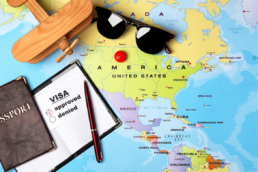The President’s third travel ban has been reinstated, for now. On Nov. 13, 2017, the United States Court of Appeals for the Ninth Circuit issued an order staying the Hawaii District Court’s decision that issued a preliminary injunction against the highly controversial travel restrictions. So what does this mean? With travel ban 3.0 now in effect, individuals from Chad, Iran, Libya, Syria, Somalia and Yemen are required to show a bona fide relationship with a person or entity in the United States.
If this sounds familiar, that’s because the language and implementation of the current ban mimics that of its predecessors. A “bona fide” family relationship includes grandparents, grandchildren, brothers-in-law, sisters-in-law, aunts, uncles, nieces, nephews and cousins. As for entities, the Ninth Circuit held that the relationship must be “formal, documented and formed in the ordinary course of business.” It must not be formed for the sole purpose of avoiding the travel restrictions. One thing to keep in mind, is that Sections (d) and (f) of most recent ban have not been affected by the Ninth Circuit ruling. Individuals hailing from Venezuela and North Korea continue to face restrictions set forth in the Presidential Proclamation.
Future of the Travel Ban
For starters, Travel Ban 3.0 will be argued before both the Ninth and Fourth Circuits. Oral argument is scheduled for next week, and how the courts will decide is still being debated. Up until very recently, the arguments in favor of the travel ban’s legality seemed fairly strong. Many legal experts believed that the flaws surrounding the first two bans had been reconciled. The latest ban came after the Department of Homeland Security conducted an expansive national security investigation into the security and reporting protocols of roughly 200 countries. Justification for the ban appears to be well-founded.
However, the President may have complicated the situation via Twitter. Earlier this week, President Trump received major backlash after he shared three inflammatory anti-Muslim videos. Why does this matter? This is significant based on the fact that the first two travel bans were criticized and challenged for unconstitutionally discriminating against individuals based on religion. The President’s latest act of retweeting these videos could ultimately undermine any legitimate justification for the travel restrictions, as it only adds to the argument of many challengers claiming the travel restrictions to be a “Muslim ban.”
This also would not be the first time President Trump’s Twitter account was used as evidence against imposing country-specific travel restrictions. The courts used the President’s own comments and tweets stemming back to his run for President as evidence in blocking the first and second travel bans.
If you are interested in immigrating to the United States or have questions on how the latest travel ban may affect you, please contact our office to schedule a consultation with one of our attorneys today!
Ready to have Berardi on your side?
Whether you’re a business looking to hire or a professional hoping to relocate, immigration law can be complicated. But you don’t have to do it alone. Put our experience to work for you.



